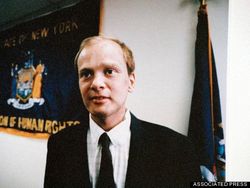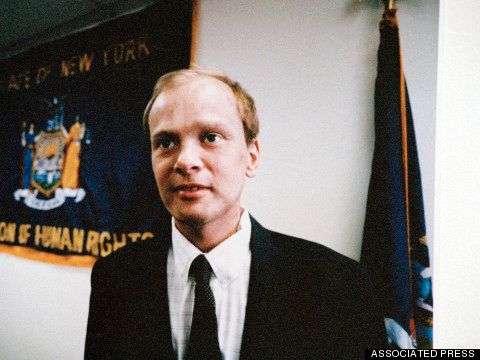Bowers, a gay New York attorney, was diagnosed in April 1986 as having Kaposi's sarcoma and AIDS. He was dismissed from his position with the Chicago-based Baker & McKenzie after 12 of the law firm's 15 partners voted in October of that same year to do so. His last day with Baker & McKenzie was Dec 5, 1986. He subsequently filed a complaint with the New York State Division of Human Rights. On July 14, 1987, the New York State Division of Human Rights held the first hearings in the case in a trial format, with Judge Amos Carnegie overseeing the proceedings. A representative for the firm claimed that Bowers was dismissed because of performance issues, while his complaint charged that he had been fired from his job because of the skin lesions that had begun appearing on his body and face. Bowers died in September, at the age of 33, just two months after the hearings began. The hearings would take place over a total of 39 days, spanning 2 years. It took more than 6 years for the case to finally be resolved, when in December 1993 the agency awarded its largest settlement; $500,000 in compensatory damages and the back pay he would have earned had he remained employed. Baker & McKenzie appealed but subsequently withdrew the appeal in 1995 after they negotiated a confidential settlement with Bowers' family, forbidding parties from ever discussing the case or the terms of the agreement.
Bowers' case inspired the film Philadelphia, in which the following message appears at the end credits:
This motion picture was inspired in part by Geoffrey Bowers' AIDS discrimination lawsuit, the courage and love of the Angius family and the struggles of the many others who, along with their loved ones, have experienced discrimination because of AIDS.
Bowers, a gay New York attorney, was diagnosed in April 1986 as having Kaposi's sarcoma and AIDS. He was dismissed from his position with the Chicago-based Baker & McKenzie after 12 of the law firm's 15 partners voted in October of that same year to do so. His last day with Baker & McKenzie was Dec 5, 1986. He subsequently filed a complaint with the New York State Division of Human Rights. On July 14, 1987, the New York State Division of Human Rights held the first hearings in the case in a trial format, with Judge Amos Carnegie overseeing the proceedings. A representative for the firm claimed that Bowers was dismissed because of performance issues, while his complaint charged that he had been fired from his job because of the skin lesions that had begun appearing on his body and face. Bowers died in September, at the age of 33, just two months after the hearings began. The hearings would take place over a total of 39 days, spanning 2 years. It took more than 6 years for the case to finally be resolved, when in December 1993 the agency awarded its largest settlement; $500,000 in compensatory damages and the back pay he would have earned had he remained employed. Baker & McKenzie appealed but subsequently withdrew the appeal in 1995 after they negotiated a confidential settlement with Bowers' family, forbidding parties from ever discussing the case or the terms of the agreement.
Bowers' case inspired the film Philadelphia, in which the following message appears at the end credits:
This motion picture was inspired in part by Geoffrey Bowers' AIDS discrimination lawsuit, the courage and love of the Angius family and the struggles of the many others who, along with their loved ones, have experienced discrimination because of AIDS.
Sponsored by Ancestry
Advertisement
Explore more
Sponsored by Ancestry
Advertisement


